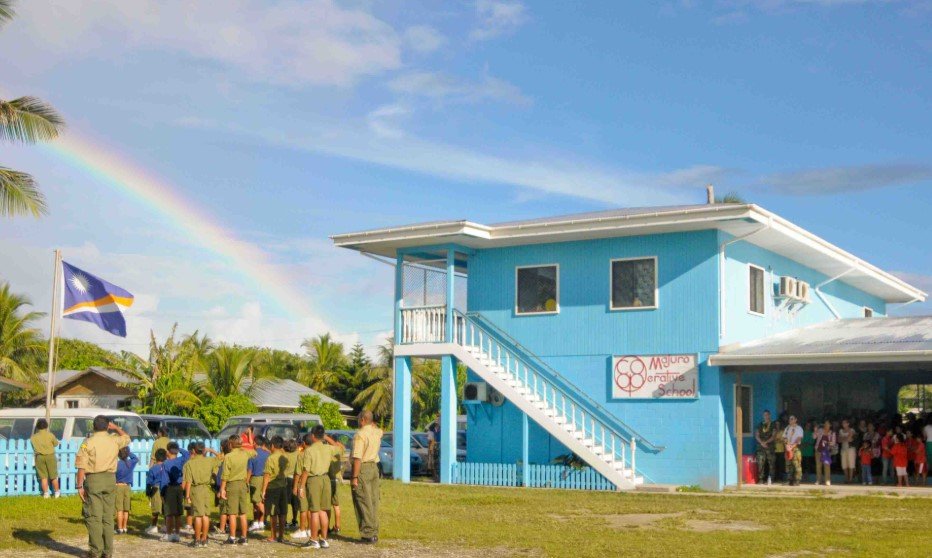While global sentiment often shifts against Israel in major international forums, a cluster of small island nations in the South Pacific continues to back the Jewish state—consistently, quietly, and with surprising loyalty.
Each time a United Nations resolution concerning Israel comes up for vote, the same pattern repeats itself: expected pushback from Europe, condemnation from much of Asia, and abstentions across Africa and Latin America. But scattered across the Pacific, a handful of tiny island nations hit the green “yes” button for Israel—and they’ve been doing it for decades.
In a world where diplomatic winds shift with headlines, Israel’s most consistent allies aren’t always the ones with big militaries or massive economies. They’re places like Palau, Nauru, Micronesia, and the Marshall Islands—microstates with little global sway, but a whole lot of political courage.
Micronesia’s 100% Track Record
Among the most steadfast of Israel’s allies is the Federated States of Micronesia. According to data from UN Watch, Micronesia hasn’t voted against Israel in any General Assembly resolution for more than a decade.
Yes, you read that right—zero votes against.
It’s a record even the U.S. can’t boast. Washington, for all its strong ties with Israel, has occasionally abstained or supported resolutions critical of Jerusalem. Micronesia? Never.
The alliance began in the late 1980s when Micronesia gained independence and established diplomatic ties with Israel. What followed was a bond anchored in mutual support: Micronesia received aid and agricultural technology; Israel got a rare, reliable friend.

The “Oceania Four” and Their Reasons
Micronesia isn’t alone. The Marshall Islands, Nauru, and Palau form the backbone of what many quietly call the “Oceania Four.” These countries consistently support Israel at the UN and are often part of the tiny minority that votes with Israel and the U.S. on controversial issues.
The reasons vary:
-
Shared values as democracies with strong ties to the U.S.
-
Christian-majority populations with cultural affinity for Israel
-
Bilateral aid and development programs from Israel
-
Personal relationships with Israeli diplomats and volunteers
In Palau, for example, Israeli irrigation techniques helped improve local farming. In Nauru, diplomatic engagement gave the country more global visibility. And in the Marshall Islands, partnerships on healthcare and education have deepened over time.
It’s not just about diplomacy—it’s about people, connection, and belief.
A Vote and a Backlash
Every vote comes with a cost, though.
When the South Pacific islands support Israel, their representatives—and even their civilians—often face online abuse. After each major vote, especially on Palestine-related issues, citizens from these countries report being bombarded with negative comments.
One Marshallese student in Australia recently told Pacific media that after their country voted in support of Israel, their inbox was flooded with angry DMs and accusations of being a “colonial puppet.”
It’s a strange kind of punishment for showing loyalty.
Online criticism isn’t just noise, either. It’s a psychological toll, especially for young people abroad who suddenly find themselves defending their country’s foreign policy choices.
Still, the governments haven’t changed course. If anything, they’ve leaned in further.
Tonga Joins the Fold
Something unusual happened after October 7, 2023. While much of the Global South distanced itself from Israel in the aftermath of the Hamas-Israel war, Tonga went the other way.
For the first time ever, the Polynesian kingdom voted in favor of Israel in a key UN vote. It wasn’t just symbolic—it was a geopolitical statement.
Analysts say Tonga’s decision was partly influenced by stronger regional alignment with U.S. allies, and partly by its growing relationship with Israeli NGOs.
One line: Tonga’s vote shocked even some Israeli diplomats.
Whether Tonga continues this trend remains to be seen, but for now, it’s part of a growing Pacific bloc choosing to stand by Israel even as international criticism mounts.
UN Vote Tallies Speak Volumes
Just how isolated are Israel and its Pacific allies at the UN? Here’s a snapshot of voting patterns over the past five years:
| Country | % of Votes Supporting Israel (2019–2024) |
|---|---|
| Micronesia | 100% |
| Marshall Islands | 96% |
| Nauru | 92% |
| Palau | 90% |
| United States | 82% |
| Australia | 58% |
| United Kingdom | 43% |
| India | 27% |
These numbers show a remarkable pattern: the countries backing Israel most consistently aren’t G7 powers—they’re Pacific microstates with populations under 150,000.
Not Just Votes—Real Relationships
It’s easy to assume these alliances are purely transactional. But they’re not.
Israeli volunteers have been quietly working in Pacific nations for years. From disaster relief to clean water initiatives, aid efforts have built lasting goodwill. Israeli doctors and agricultural experts have trained locals in places most global powers wouldn’t look twice at.
One former ambassador to the Marshall Islands put it simply: “Israel showed up when others didn’t.”
And it goes both ways. South Pacific leaders frequently visit Israel, often citing biblical ties and moral alignment. At the 2024 Herzliya Conference, Palau’s president called Israel “a brother nation.”
